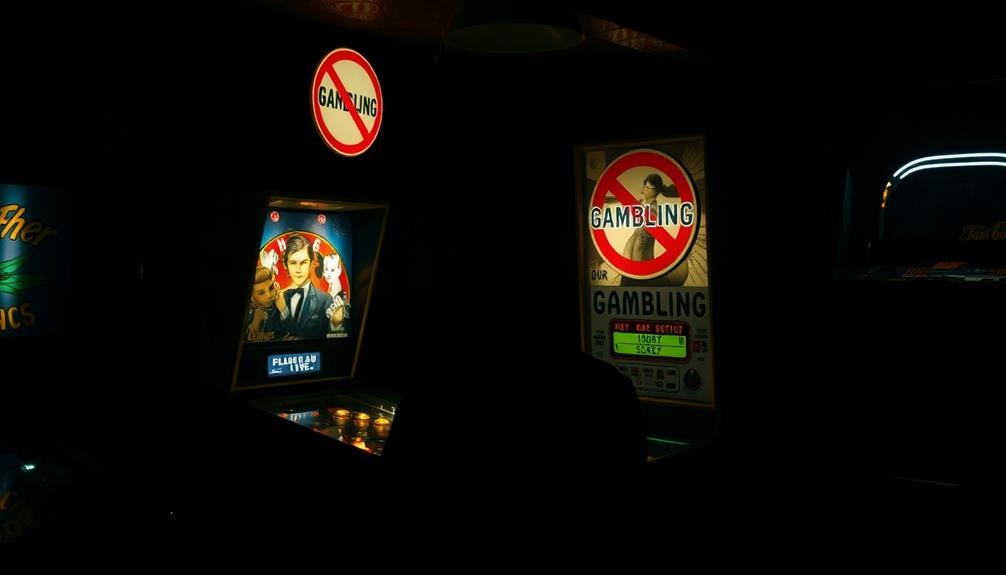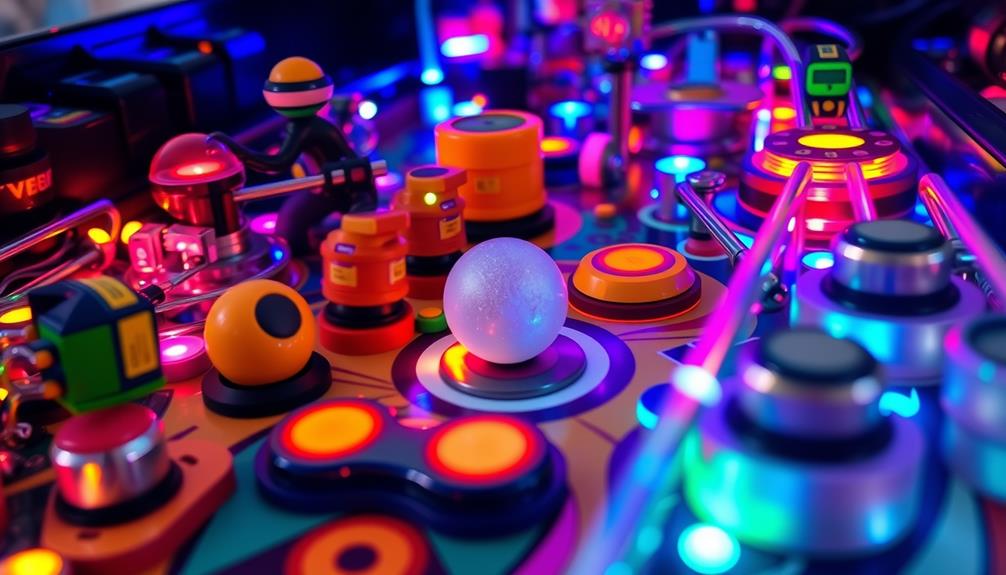It is against the law for underage individuals to participate in pinball in South Carolina due to outdated legislation that still categorizes the activity as a form of gambling. This restriction is rooted in historical concerns about youth gambling behaviors, despite pinball being recognized as a game of skill in many other states since the 1970s. While the law is rarely enforced, it inhibits youth involvement and limits family-friendly options at local establishments. Activists are advocating for reform to reflect contemporary attitudes towards gaming. Learn more about community initiatives that are striving to challenge these antiquated notions and foster a more inclusive setting.
Key Takeaways
- Pinball is classified as a game of chance, raising concerns about youth gambling and financial waste, leading to its prohibition for minors.
- Historical fears of gambling habits in youth have perpetuated the ban on minors playing pinball in South Carolina.
- The law remains largely unenforced, resulting in minimal reports of charges against minors.
- Legislative efforts to repeal the ban have faced challenges, particularly from the Judiciary Committee and gambling associations.
- Misconceptions linking pinball to gambling hinder youth engagement and limit local business opportunities.
Historical Overview of Pinball Laws
Pinball's journey through legal regulations in South Carolina has been anything but straightforward. Starting in the 1940s, pinball was classified under pinball laws as a game of chance due to store owners offering prizes. This led to widespread concerns about gambling, particularly fears of minors wasting their money on these machines.
During the 1970s, many states recognized pinball as a game of skill, prompting the repeal of similar laws elsewhere. However, South Carolina has clung to its prohibition, barring individuals under 18 from playing pinball.
This outdated regulation reflects the lingering historical fears surrounding youth and gambling, even as society evolved. Understanding the importance of financial health in managing recreational spending is essential, particularly in the context of youth engagement with games like pinball.
Despite the law's strict wording, there's been a notable disconnect between legislation and reality. You won't find reports of charges against minors for playing pinball, suggesting that enforcement is virtually nonexistent.
While other states have embraced pinball as a legitimate recreational activity, South Carolina remains unique in its stringent enforcement of these laws. This creates a curious dichotomy where the spirit of modern gaming culture clashes with outdated legal restrictions, leaving many to question the relevance of such prohibitions today.
Reasons for the Current Ban
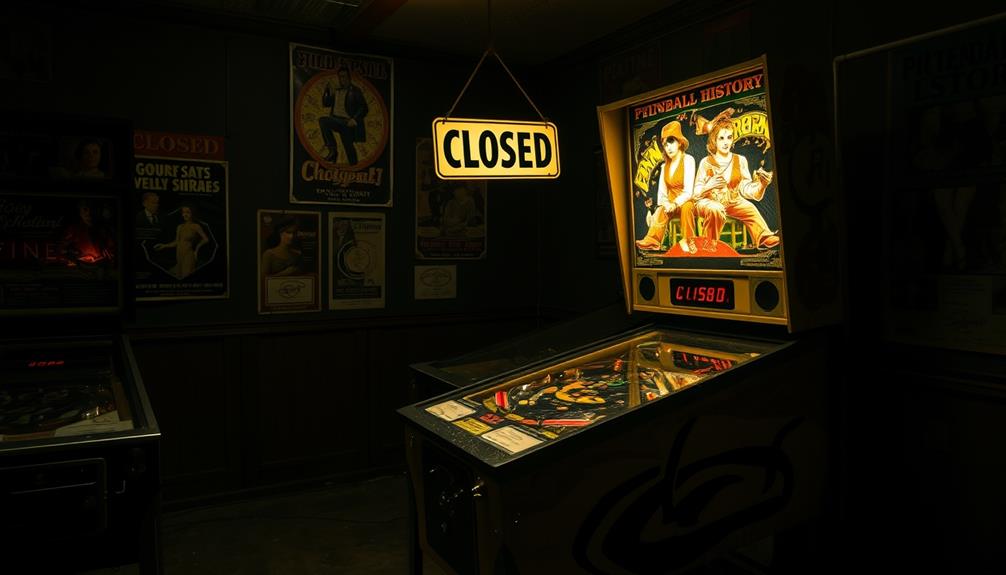
The ban on pinball for individuals under 18 in South Carolina stems from outdated perceptions of the game as a gambling activity. This law, dating back to the 1940s, classifies pinball as a game of chance, ignoring its evolution into a skill-based game.
In addition, societal views on activities like pinball often reflect broader attitudes towards youth engagement in entertainment, similar to how astrological compatibility can influence relationship dynamics. Here are some key reasons behind the current ban:
- Historical Context: Concerns arose about children wasting money and time, leading to potential gambling habits.
- Lack of Updates: Despite pinball's transformation in the 1970s, South Carolina law hasn't changed, leaving it an outlier compared to most states.
- Misconceptions: Persistent beliefs linking pinball to gambling continue to entrench the ban, even as advocacy efforts endeavor to redefine public perception.
- Enforcement: While the law is largely unenforced and no charges exist against minors for playing pinball, it still restricts youth engagement in this recreational activity.
This outdated perspective not only limits your freedom to enjoy pinball but also prevents a fun, skill-building experience for those under the age of 18 in South Carolina.
It's high time for a reevaluation of these laws to reflect the true nature of the game.
Legislative Efforts for Change
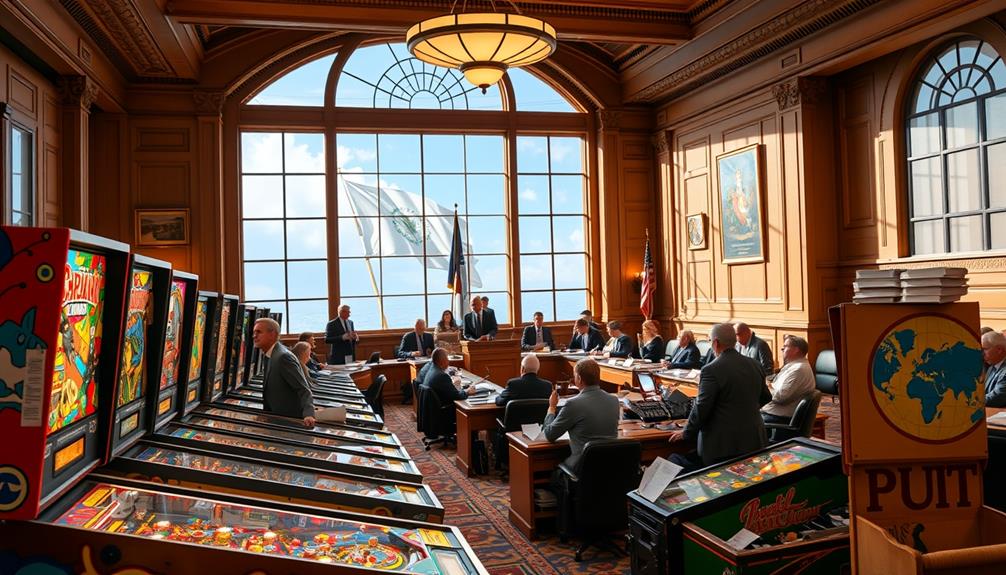
You might be surprised to learn that a recent bill sponsored by Representative Todd Rutherford is gaining traction to repeal the pinball ban in South Carolina.
This legislative effort reflects a growing interest in enhancing recreational options, similar to how cruise ships offer diverse experiences for guests luxury cruises provide exclusive amenities.
With unanimous support from the House and backing from community advocates, there's a real push for change despite previous setbacks in the Senate.
As more voices join the conversation, it's clear that the battle for pinball is far from over.
Recent Legislative Developments
Momentum is building for change in South Carolina's outdated gaming laws as a new bill, sponsored by Representative Todd Rutherford, seeks to repeal the ban on minors playing pinball.
This legislation has advanced unanimously to the House floor, showcasing strong bipartisan support for the proposed change.
Data-driven strategies yield measurable results, and the growing support highlights the community's desire for a more inclusive gaming environment.
Key elements of this bill include:
- Modernization: It aims to align pinball's classification as a skill-based game rather than a game of chance.
- Community Awareness: Increased advocacy from local arcade owners has highlighted the negative impact the ban has on youth recreational activities.
- Law Enforcement Support: Officials like Chester County Sheriff Max Dorsey back the bill, stressing the need for safe gaming experiences for children.
- Legislative History: Previous attempts to modify the law met resistance, with a similar bill that passed the House dying in the Senate.
If passed, this new law could position South Carolina as a more progressive state in the nation regarding gaming regulations, ultimately providing a legal avenue for minors to enjoy pinball in a safe environment.
Community Support and Advocacy
Community members are rallying behind the bill to repeal the ban on minors playing pinball, showcasing a strong desire for change. This movement is fueled by significant community support, including endorsements from local leaders like Chester County Sheriff Max Dorsey.
They recognize that pinball machines are skill-based games, not gambling devices, which is an essential distinction in the advocacy for this legislative reform. Additionally, similar advocacy efforts can be seen in various contexts, such as the importance of background checks to guarantee community safety and trust in other areas like employment and homeowner associations (importance of background checks).
The push for change isn't just coming from officials; local business owners are also advocating for children's rights to engage in recreational activities like pinball. They understand the cultural significance of these machines and want to see laws that reflect current attitudes toward gaming.
Grassroots movements have emerged, with local petitions gathering momentum, emphasizing a collective wish for modernized legislation.
Challenges in Senate Approval
Despite broad support within the House, the bill to allow minors to play pinball faces significant hurdles in the Senate. This resistance highlights the challenges of maneuvering South Carolina's legislative processes. Although the bill, sponsored by Representative Todd Rutherford, has garnered unanimous backing, it continues to stall.
The ongoing debate echoes the complexities seen in various legal processes, such as those involved in the legal process of divorce, where maneuvering legislative and legal frameworks can be equally challenging.
Here are some key challenges impacting the bill's progress:
- Judiciary Committee Obstacles: Previous attempts to amend the law have faltered in the Senate Judiciary Committee, where concerns often arise.
- Gambling Associations: Strong opposition from gambling associations, fearing pinball's association with gambling, complicates discussions further.
- Historical Context: The historical stigma surrounding pinball as a gambling device adds layers of resistance among lawmakers.
- Community Engagement: Grassroots movements have raised awareness, but ongoing advocacy is essential to maintain pressure on the Senate.
Moreover, the current lack of enforcement against minors playing pinball indicates a disconnect between legislative intent and practical application. This complicates the debate on whether the existing law, which prohibits such activity, should be repealed.
Without addressing these challenges, the bill's fate remains uncertain.
Impact on Local Businesses

The ban on minors playing pinball in South Carolina has a significant impact on local businesses, particularly those that rely on arcade games for customer engagement. Venues like Bang Back Pinball Lounge struggle to attract family-friendly clientele due to legal implications, leading to decreased revenue opportunities. The restrictions on pinball machine installations limit your ability to enhance customer engagement and increase foot traffic.
| Issue | Impact on Businesses | Potential Solutions |
|---|---|---|
| Legal Restrictions | Decreased family clientele | Advocate for law reform |
| Revenue Loss | Reduced income from pinball games | Host pinball tournaments |
| Confusion Over Enforcement | Uncertainty about legal risks | Seek clarity from lawmakers |
| Hindered Community Events | Fewer opportunities for economic growth | Organize community pinball events |
The lack of enforcement creates a confusing environment for you as a business owner, making it hard to navigate legal risks. Additionally, community events and tournaments that could drive economic growth are hindered, further reducing opportunities for local businesses to engage customers. If advocacy for law reform succeeds, it may revitalize the arcade scene, providing significant economic benefits for local establishments.
Community Perspectives on Pinball

When you think about pinball, you might see it as just a game, but it offers so much more for youth engagement and community building.
Many people misunderstand pinball as a form of gambling, yet it's actually a skill-based activity that fosters friendships and teamwork.
In fact, community events like youth leagues can serve as a great opportunity for kids to learn about proper diet and care for their pets, while also enjoying friendly competition.
Community events like youth leagues highlight how pinball can unite families and create a vibrant culture.
Youth Engagement Opportunities
Pinball isn't just a game; it's a vibrant way for youth in South Carolina to engage with their peers and build essential skills. Through structured play, kids can't only have fun but also foster community bonding and skill development.
Additionally, participation in games like pinball can enhance cognitive abilities, making it a valuable activity for mental agility financial considerations for elderly care.
Here are some key benefits of pinball for youth:
- Social Skills: Engaging in pinball leagues like Little Flippers helps children aged 4 to 12 enhance their social skills and form lasting friendships.
- Commitment: Regular participation teaches youth the value of commitment, as they endeavor to improve their gameplay and teamwork.
- Safe Spaces: Family-friendly events at venues like Bang Back Pinball Lounge create safe environments for children to socialize and engage in recreational activities.
- Alternative to Screens: Local business owners advocate for repealing pinball laws, highlighting the importance of providing healthier alternatives to screen time.
With a 58% increase in participation, it's clear that young people are enthusiastic to play pinball in SC.
This skill-based game offers educational benefits beyond traditional settings, preparing youth for future challenges while they enjoy themselves.
Misconceptions About Gambling
Misunderstandings about pinball often cloud its reputation, leading many to mistakenly view it as a gambling activity. Historically, pinball was classified as gambling due to outdated laws enacted in the 1940s, primarily to protect youth from spending their money on games. These misconceptions persist, and many community members still associate pinball with gambling rather than recognizing it as a skill-based recreational activity.
Additionally, the ongoing dialogue surrounding the benefits of curiosity and how it enhances problem-solving abilities can shed light on the value of engaging in skill-based games like pinball, which promote critical thinking and creativity the transformative power of curiosity.
Local business owners express frustration over these outdated laws, which stigmatize pinball machines as gambling devices. This stigma limits their ability to engage youth in meaningful, fun experiences. Advocates for pinball emphasize its true value, focusing on how it fosters social skills, friendships, and community engagement—elements that have little to do with gambling.
The ongoing dialogue surrounding pinball laws highlights the urgent need to redefine perceptions. By educating the public about pinball's recreational benefits, we can shift the narrative and align legal frameworks with the current understanding of pinball as a legitimate form of entertainment.
It's time to move past the misconceptions and embrace pinball for what it truly is: an enjoyable, skill-based game that brings people together.
Community Events and Culture
Local communities are rallying around pinball as a vibrant form of entertainment that fosters connection and collaboration. In South Carolina, community events are bringing families together to enjoy this engaging pastime.
Venues like Bang Back Pinball Lounge host Saturday morning gatherings, creating a welcoming space for everyone. These events are reminiscent of the way children engage with well-draining soil in gardening, as they learn and grow together.
Here are some key aspects of the pinball culture in the area:
- Youth Engagement: Local leagues like Little Flippers offer structured play for kids aged 4 to 12, promoting skill development and teamwork.
- Emotional Connection: Children participating in pinball events report positive feelings, reinforcing bonds within the community.
- Growth of Interest: The pinball community in South Carolina has surged by 58%, showcasing a growing passion for this recreational activity.
- Advocacy for Change: Business owners and community members are pushing to change the pinball law, viewing it as a healthier leisure option for youth compared to excessive screen time.
Cultural Shift in Gaming
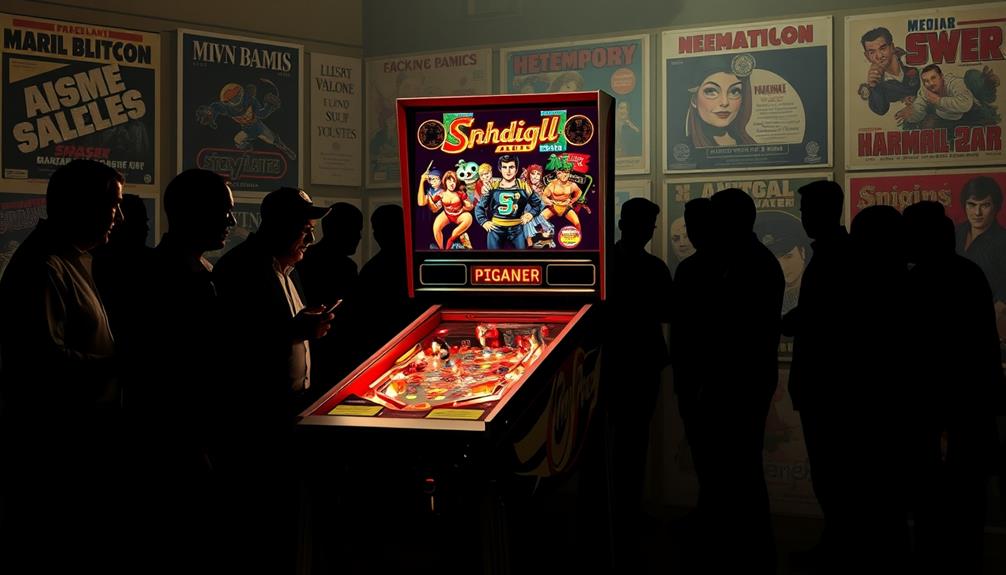
The resurgence of pinball has sparked a cultural shift in gaming, transforming it into a recognized form of entertainment rather than merely a gambling pastime. In South Carolina, the pinball community has experienced a remarkable 58% increase in participation, highlighting its growing popularity as a hobby and competitive sport. Local businesses like Bang Back Pinball Lounge thrive on community engagement, hosting family-friendly events that foster social interaction among all ages.
As perceptions evolve, pinball is increasingly seen as a skill-based game, distancing itself from its outdated reputation as a form of gambling. Weekly leagues and tournaments draw dozens of players, emphasizing both fun and competition while creating camaraderie within the pinball community.
Here's a visual representation of this cultural shift:
| Aspect | Traditional View | Current View |
|---|---|---|
| Game Perception | Form of gambling | Legitimate entertainment |
| Community Engagement | Niche interest | Thriving community |
| Player Demographics | Mostly adults | All ages welcomed |
| Competitive Nature | Casual play | Structured leagues and tournaments |
| Advocacy | Minimal efforts | Active push for legal change |
This cultural shift highlights pinball's evolution and its emerging status as a respected social activity.
Future of Pinball Legislation

Advocating for change, supporters of pinball in South Carolina are pushing for legislation that could finally lift the ban on minors playing this beloved game. With Representative Todd Rutherford's bill advancing unanimously in the House, the future of pinball legislation looks promising.
Here's what to expect if the ban is lifted:
- Increased Youth Participation: Young players could engage more in pinball activities, fostering a new generation of enthusiasts. This surge in interest may parallel the rise of community-oriented events, similar to community-building activities among preppers that promote engagement and learning.
- Community Events: Expect more tournaments and gatherings, strengthening local bonds through friendly competition.
- Economic Growth: Local businesses like arcades and lounges could thrive, leading to job creation and revitalization of the pinball culture.
- Cultural Shift: This legislation might redefine pinball as a skill-based game, aligning it with modern perceptions of recreational activities.
As community members and business owners advocate for this change, South Carolina could become a model for other states reconsidering outdated gaming laws.
Frequently Asked Questions
Why Is Pinball Illegal in South Carolina?
Pinball's illegal in South Carolina mainly due to outdated laws labeling it a game of chance. Concerns about youth gambling and wasting time persist, even though most states have embraced its evolution as a skill-based game. Another reason for the ban on pinball in South Carolina is the lack of understanding about the modern pinball industry, including the economic and cultural impact of pinball halls. Pinball halls, which provide social and recreational opportunities for all ages, have been successful in other states and could potentially thrive in South Carolina if the outdated laws were revised to reflect the current understanding of pinball as a skill-based game. A pinball hall overview would showcase the positive aspects of pinball, including its role in fostering community and providing a safe and enjoyable space for players of all ages.
Why Is Pinball Illegal in Some States?
Pinball's illegal status in some states stems from its historical classification as a gambling device. Concerns about youth gambling and the perception of pinball as a game of chance have influenced these restrictive laws.
What Cities Banned Pinball?
Ever wondered why pinball's not everywhere? Cities like New York, Chicago, and Los Angeles banned it due to gambling fears. While many lifted restrictions later, some places still cling to those outdated laws.
Is Pinball Considered Gambling?
Yes, pinball can be considered gambling in some contexts, particularly where financial payouts are involved. Many people see it as a game of skill, but legal definitions often classify it as a game of chance.
Conclusion
In South Carolina, the pinball ban might seem outdated, but it reflects deeper cultural attitudes toward gambling. Imagine a local arcade owner, struggling to keep their business afloat while neighboring states thrive with vibrant pinball scenes. By advocating for legislative changes, you can help revive this nostalgic pastime and support local economies. It's time to reconsider these laws and embrace the joy and community pinball can foster. Let's work together to bring pinball back to South Carolina!
